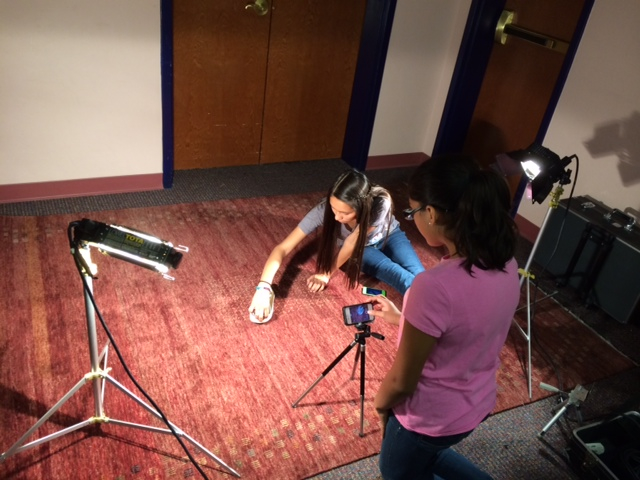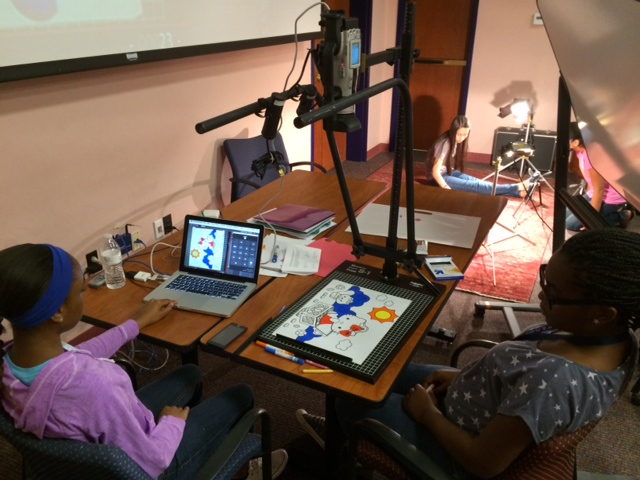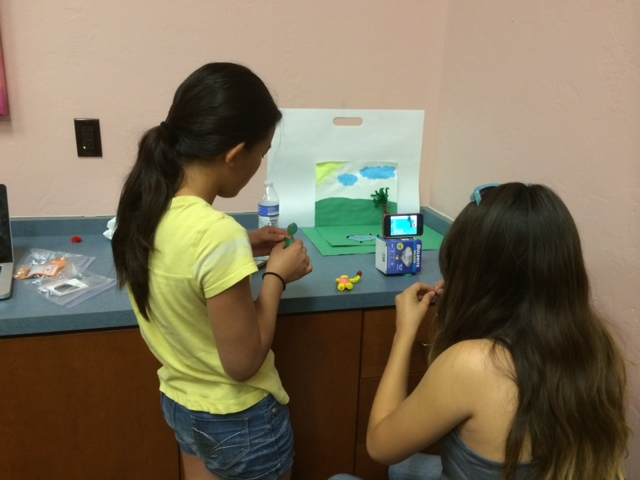Written by Andé Morgan.
Courtney Martinez started Girls Film Project, a non-profit program that teaches young women and girls about film production, media literacy, leadership, and teamwork.

The top ten highest-grossing films of 2014 have had exactly zero female directors.
This is the movie business as usual. In fact, as this infographic from Indiewire’s Women and Hollywood column illustrates, between 2009 and 2013 only 4.7 percent of feature films were directed by women.
How can we close this gender gap? Well, personal and social change go hand in hand. Or, in bumper sticker form, we can be the change. For example, if you follow our weekly tweet chat (#BitchFlicks, Tuesdays at 2 p.m. ET), then last week you caught our conversation with film critic Miriam Bale. Bale started the #HireTheseWomen hashtag to compile a list of the many talented women directors that Hollywood should hire. Social media is a powerful tool, and #HireTheseWomen has been effective at raising awareness. In the interim, since there are still few well-known female director possibility models, it is important that young women and girls know that they can make movies.
Courtney Martinez is helping to do that. Martinez is the creator of Girls Film Project (GFP), a program designed to educate young women about film production and media literacy. It’s based in Tucson, Arizona, and has been operating since 2013. Sessions are free to participants, are one week long, and cover six courses:
- Media Literacy: The student examines how gender, race, and culture are represented in the media. This course is intended to encourage students to engage in positive discourse, and to think critically about media and their impacts on society.
- Writing and Script Analysis: The students learn how to write a script, create storyboards, and deconstruct scenes to examine subtext and develop writing skills.
- Pre-production/distribution: This course describes the issues that often come up prior to filming, e.g., how to get started, budgeting, and the importance of a good story. The students also explore the requirements for film festivals, develop a pitch proposal and address promotional issues such as poster development, social media, websites and local screenings.
- Production: A hands-on course where students handle equipment and get training on how to operate cameras, tripods, microphones and other film equipment.
- Editing and Sound: The students learn the basics of editing with Final Cut Pro software. Students edit a short clip with pre-recorded footage.
- Final Project: Students put their skills to use and work as a team to make a short film, from start to finish, using submitted proposals from the course. The films may be distributed to local film festivals.
[youtube_sc url=”https://www.youtube.com/watch?v=PyJei-DrbJw”]
Martinez agreed to an interview to discuss GFP.
Bitch Flicks: Tell us about yourself.
Martinez: I came to Tucson in August of 2010 to attend graduate school at the University of Arizona. I received my master’s degree in Mexican American Studies, and worked as a teaching assistant and summer class instructor. My undergraduate degree is in film and media, and I am interested in documentary work, so I developed an interdisciplinary education focusing on cultural and gender identity in film and media.
I came to Arizona just as SB1070 was passed into law and I began thinking about how people form opinions on certain topics, my research focused on how influential media are…I wanted to harness that energy and turn it into something positive.

Bitch Flicks: How did you get interested in film?
Martinez: I worked in human services for several years (treatment centers and homeless shelters for women). I worked second and third shifts so I got to visit with the women more and listen to their stories of struggle and empowerment. I would hear comments on the streets or from local agencies about how “they got what they deserved,” or “it’s their own fault,” and I was shocked. I thought if these women could share their stories with a wider audience, society may change its negative perspective about addiction, homelessness and domestic violence. That was when I decided to use film as a means of communication.
Bitch Flicks: Do you have a philosophy of film production that you teach your students?
Martinez: My philosophy on filmmaking is to enjoy what you do and don’t limit yourself. I think it is really easy for people to get caught up in the process of filmmaking, thinking they can’t afford the right camera, or a light kit or whatever. I try to encourage students to use what they have around them to tell their stories. It does not have to be “Hollywood” to be a successful film, it just has to be authentic because that is what’s missing in mainstream media today.
Bitch Flicks: What is your teaching style?
Martinez: I enjoy the sharing of ideas and inspiration. I try to avoid lectures and use a more conversational teaching method. I am so impressed by the students’ ideas and their outlook on the world. They approach things fearlessly, which inspires me to be fearless! Mutual learning is key!
We just had a week long workshop and none of the participants had ever done animation before, but by the end of the week they all created these amazing little animations with free apps they downloaded to their phones. It is truly amazing what you can do these days with technology!

Bitch Flicks: What do your students take from GFP?
Martinez: The goal is to teach them to look at media through a critical eye, the first course covers media literacy and we do fun projects looking at gender stereotypes, hypersexuality, and commercial advertising. One participant in our last session actually found an ad about how to be sexy with the flu!
We want them to have a sense of self confidence, familiarity with technology, and inspiration to keep creating once they leave. We encourage them to find ways to get their voices and messages out there whether through writing, film, music, dance… just to get them to take an active role with media and deconstruct mainstream media messages.
Bitch Flicks: Who are your students?
Martinez: We have been fortunate to have students with a variety of backgrounds. They come from all over Tucson and range from ages 12-17. There is economic diversity as well; some students bring in iPhones, others don’t have a computer at home. Because of generous grantors, the programming is free. I hope to keep things that way so that all women and girls (i.e., anyone who self-identifies as female) have the opportunity to participate.
Bitch Flicks: How long has GFP been around, and how many student have you taught?
Martinez: Not quite a year yet, we started last fall. We had the opportunity to work with a local charter school here in Tucson and have reached out to collaborate with many great non-profits. To date we have had approximately 35 participants, and we have an almost full class at the end of July (around 15 students).
Bitch Flicks: Where do you see GFP in five years?
Martinez: I would like it to be its own fully functioning non-profit providing after school programming and weekly workshops for young women and girls. There is so much potential and I hope it continues to grow. Pan Left Productions has been instrumental to Girls Film Project getting off the ground. We also received a grant from the Women’s Foundation of Southern Arizona Unidas Program, which provided economic support for the students productions and materials. We have also been discussing crowdsourcing as a means of fundraising.
Bitch Flicks: What are you influences?
Martinez: I was raised by a single mom who worked two jobs. We struggled but she did a great job raising two kids on her own. She was a powerful role model in my life.
As a young woman, I didn’t fit society’s vision of pretty. I was a total tomboy. I thought I was weird until I found other punk rock girls who weren’t afraid to get dirty and make some noise. For me, Kathleen Hanna was a HUGE influence. I was a teenager right around the time Bikini Kill was formed and seeing such powerful women, singing about serious topics and addressing issues of sexual abuse, rape and bullying made a profound impact on my life.
In high school, being in a band helped me to find confidence and gave me the opportunity to be heard as a woman. I was fortunate enough to meet some really great guys and we started a band called Fashion Sense. We were terrible but we had a lot of fun and it was a self-defining moment for me as punk rock allowed me to explore different notions of femininity than I had learned growing up.
My film influences vary greatly from Hitchcock to Tim Burton, but I will say PBS has always inspired me to think about topics I had previously thought were boring. I blame PBS for my love of new information!
Follow Courtney Martinez and Girls Film Project on Facebook. Other examples of student work can be found here.
Also on Bitch Flicks: The New Adult: Generation Delayed.
Andé Morgan lives in Tucson, Arizona, where they write about culture, race, politics, and LGBTQ issues. Follow them @andemorgan.
